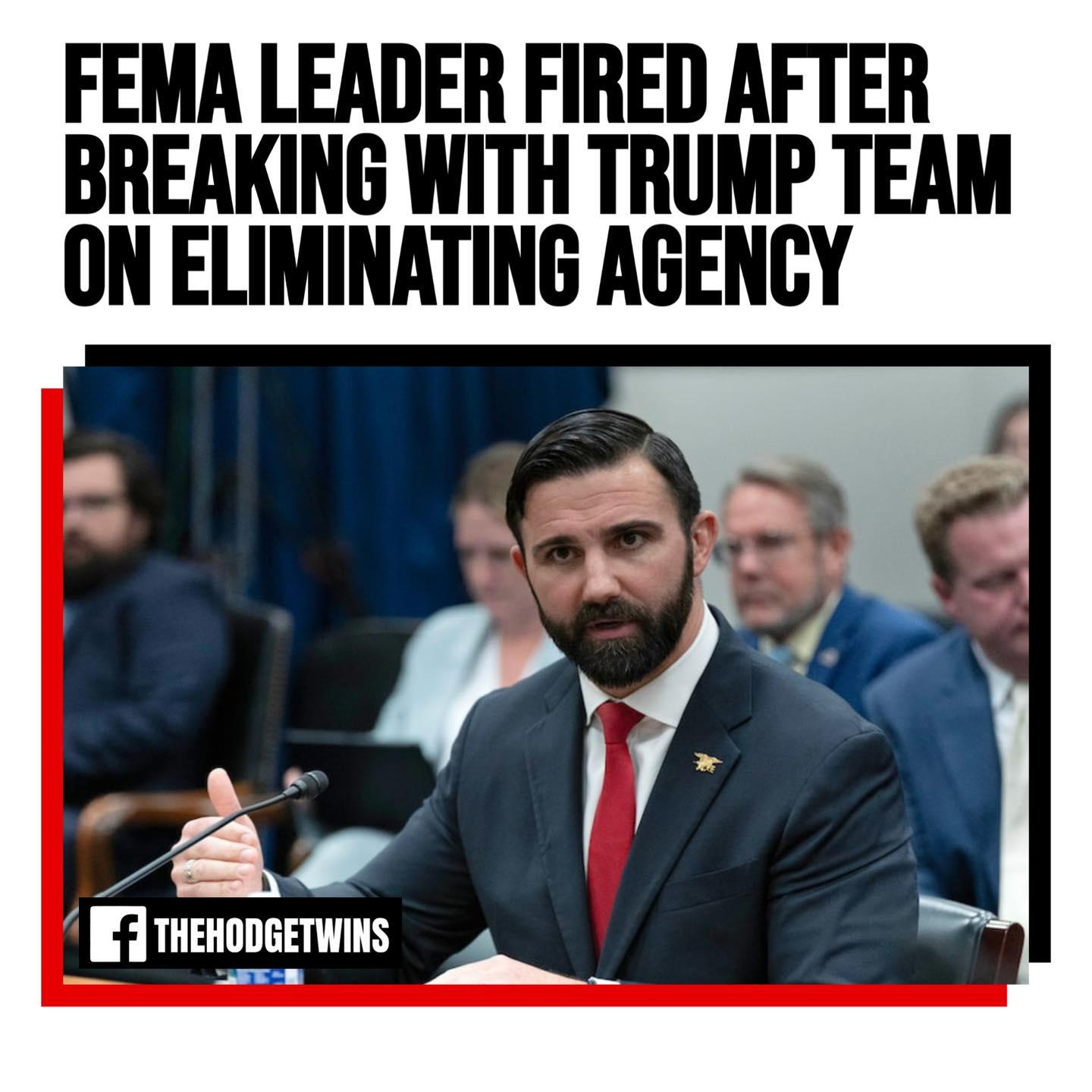Cameron Hamilton, the acting administrator of the Federal Emergency Management Agency (FEMA), was abruptly ousted from his position on Thursday by Homeland Security Secretary Kristi Noem, just one day after he publicly opposed President Donald Trump’s calls to eliminate the agency. The dismissal, confirmed by FEMA and Department of Homeland Security (DHS) spokespersons, has raised concerns about the agency’s leadership stability as the Atlantic hurricane season approaches on June 1.

Hamilton, a former Navy SEAL appointed by Trump in January to lead FEMA, was summoned to DHS headquarters in Washington on Thursday morning, where he was informed of his termination by Deputy Homeland Security Secretary Troy Edgar and Trump adviser Corey Lewandowski. He returned to FEMA headquarters to collect his belongings and was escorted out, according to multiple sources familiar with the situation. David Richardson, a senior DHS official and former Marine Corps officer who most recently led the Countering Weapons of Mass Destruction Office, has been named the new acting FEMA administrator.
The firing followed Hamilton’s testimony before the House Appropriations Homeland Security Subcommittee on Wednesday, where he broke ranks with the Trump administration’s stance on FEMA. When pressed by lawmakers, including Representative Rosa DeLauro (D-CT), about proposals to dismantle the agency, Hamilton stated, “I do not believe it is in the best interest of the American people to eliminate the Federal Emergency Management Agency.” He added that such decisions should be left to the president and Congress, emphasizing FEMA’s critical role in supporting communities during major disasters.
Hamilton’s remarks directly contradicted statements made by President Trump and Secretary Noem. Trump, who has repeatedly criticized FEMA as inefficient and partisan, suggested during a January visit to North Carolina—devastated by Hurricane Helene—that the agency could be “terminated” and its responsibilities shifted to states. Noem echoed this sentiment in a Tuesday hearing, telling the same committee that Trump believes “FEMA, as it exists today, should be eliminated,” advocating for empowering states with federal support instead.
The timing of Hamilton’s dismissal has sparked accusations of retaliation. Representative DeLauro condemned the firing, calling Hamilton a “dedicated public servant” and demanding an explanation from the Trump administration. “President Trump fires anyone who is not blindly loyal to him,” she said in a statement. Posts on X reflected similar sentiments, with some users labeling the move as “retaliation and power abuse” and expressing alarm over the administration’s handling of dissent. However, White House Press Secretary Karoline Leavitt defended the decision, stating that Hamilton’s testimony was “contrary to what the president believes.”
Hamilton’s tenure at FEMA was marked by efforts to reform the agency, including proposals to reduce federal assistance for smaller disasters and shift responsibilities to states. In April, he sent a six-page memo to the White House suggesting ways to curtail FEMA’s role, though he consistently advocated for maintaining its core mission. Despite lacking the emergency management experience required by federal law for a permanent FEMA administrator, Hamilton was praised by some colleagues and lawmakers for his leadership. Representative Mark Green (R-TN), chair of the House Homeland Security Committee, posted on X Wednesday that Hamilton had done a “fantastic job,” a message Hamilton reposted hours before his firing.
The appointment of David Richardson, who also lacks direct emergency management experience, has raised concerns among experts. Deanne Criswell, FEMA’s administrator under President Biden, warned that Richardson faces a steep learning curve with hurricane season looming. “He’s probably got less emergency management experience than Hamilton did,” she said, noting the challenge of building relationships with key staff in such a short time. Chad Berginnis, executive director of the Association of State Floodplain Managers, called the leadership uncertainty “concerning” given the approaching hurricane season and ongoing spring flood risks.
FEMA’s future remains uncertain as the Trump administration pushes for significant changes. Trump’s January 24 executive order established a FEMA Review Council, co-chaired by Noem and Defense Secretary Pete Hegseth, to assess the agency’s role and recommend reforms, with its first meeting scheduled for May 20. The administration’s fiscal 2026 budget proposes a $644 million cut to FEMA’s grant programs, despite increasing the Disaster Response Fund. Meanwhile, bipartisan lawmakers have introduced the “Fixing Emergency Management for Americans Act,” which would elevate FEMA to a cabinet-level agency to strengthen its disaster response capabilities.
The ouster of Hamilton, coupled with the loss of approximately 2,000 FEMA employees since January, has heightened fears of instability at a critical time. As the agency navigates this leadership shakeup, its ability to coordinate federal disaster response will be closely watched, particularly by communities still recovering from recent catastrophes like Hurricane Helene, which killed 250 people and caused $78.7 billion in damage.






